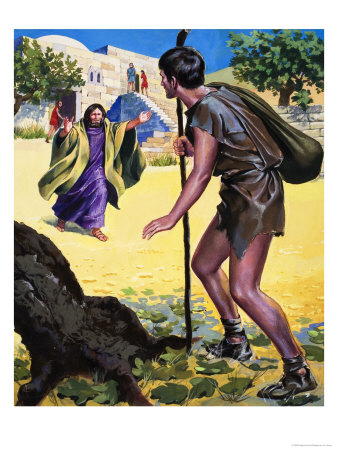
Come Home
What a picture here of the sinner's state! Although surrounded with the blessings of His love, there is nothing that the sinner, bent on self-indulgence and sinful pleasure, desires so much as separation from God. Like the ungrateful son, he claims the good things of God as his by right. He takes them as a matter of course, and makes no return of gratitude, renders no service of love. As Cain went out from the presence of the Lord to seek his home; as the prodigal wandered into the "far country," so do sinners seek happiness in forgetfulness of God. (Romans 1:28.)
Whatever the appearance may be, every life centered in self is squandered. Whoever attempts to live apart from God is wasting his substance. He is squandering the precious years, squandering the powers of mind and heart and soul, and working to make himself bankrupt for eternity. The man who separates from God that he may serve himself, is the slave of mammon. The mind that God created for the companionship of angels has become degraded to the service of that which is earthly and bestial. This is the end to which self-serving tends.
If you have chosen such a life, you know that you are spending money for that which is not bread, and labor for that which satisfieth not. There come to you hours when you realize your degradation. Alone in the far country you feel your misery, and in despair you cry, "O wretched man that I am! who shall deliver me from the body of this death?" Romans 7:24. It is the statement of a universal truth which is contained in the prophet's words, "Cursed be the man that trusteth in man, and maketh flesh his arm, and whose heart departeth from the Lord. For he shall be like the heath in the desert, and shall not see when good cometh; but shall inhabit the parched places in the wilderness, in a salt land and not inhabited." Jeremiah 17:5,6. God "maketh His sun to rise on the evil and on the good, and sendeth rain on the just and on the unjust" (Matthew 5:45); but men have the power to shut themselves away from sunshine and shower. So while the Sun of Righteousness shines, and the showers of grace fall freely for all, we may by separating ourselves from God still "inhabit the parched places in the wilderness."
The love of God still yearns over the one who has chosen to separate from Him, and He sets in operation influences to bring him back to the Father's house. The prodigal son in his wretchedness "came to himself." The deceptive power that Satan had exercised over him was broken. He saw that his suffering was the result of his own folly, and he said, "How many hired servants of my father's have bread enough and to spare, and I perish with hunger! I will arise and go to my father." Miserable as he was, the prodigal found hope in the conviction of his father's love. It was that love which was drawing him toward home. So it is the assurance of God's love that constrains the sinner to return to God. "The goodness of God leadeth thee to repentance." Romans 2:4. A golden chain, the mercy and compassion of divine love, is passed around every imperiled soul. The Lord declares, "I have loved thee with an everlasting love; therefore with loving-kindness have I drawn thee."
Jeremiah 31:3.
The son determines to confess his guilt. He will go to his father, saying, "I have sinned against heaven, and before thee, and am no more worthy to be called thy son." But he adds, showing how stinted is his conception of his father's love, "Make me as one of thy hired servants."
The young man turns from the swine herds and the husks, and sets his face toward home. Trembling with weakness and faint from hunger, he presses eagerly on his way. He has no covering to conceal his rags; but his misery has conquered pride, and he hurries on to beg a servant's place where he was once a child.
Little did the gay, thoughtless youth, as he went out from his father's gate, dream of the ache and longing left in that father's heart. When he danced and feasted with his wild companions, little did he think of the shadow that had fallen on his home. And now as with weary and painful steps he pursues the homeward way, he knows not that one is watching for his return. But while he is yet "a great way off" the father discerns his form. Love is of quick sight. Not even the degradation of the years of sin can conceal the son from the father's eyes. He "had compassion, and ran, and fell on his neck" in a long, clinging, tender embrace.
The father will permit no contemptuous eye to mock at his son's misery and tatters. He takes from his own shoulders the broad, rich mantle, and wraps it around the son's wasted form, and the youth sobs out his repentance, saying, "Father, I have sinned against heaven, and in thy sight, and am no more worthy to be called thy son." The father holds him close to his side, and brings him home. No opportunity is given him to ask a servant's place. He is a son, who shall be honored with the best the house affords, and whom the waiting men and women shall respect and serve.
The father said to his servants, "Bring forth the best robe, and put it on him…
COL 200-203